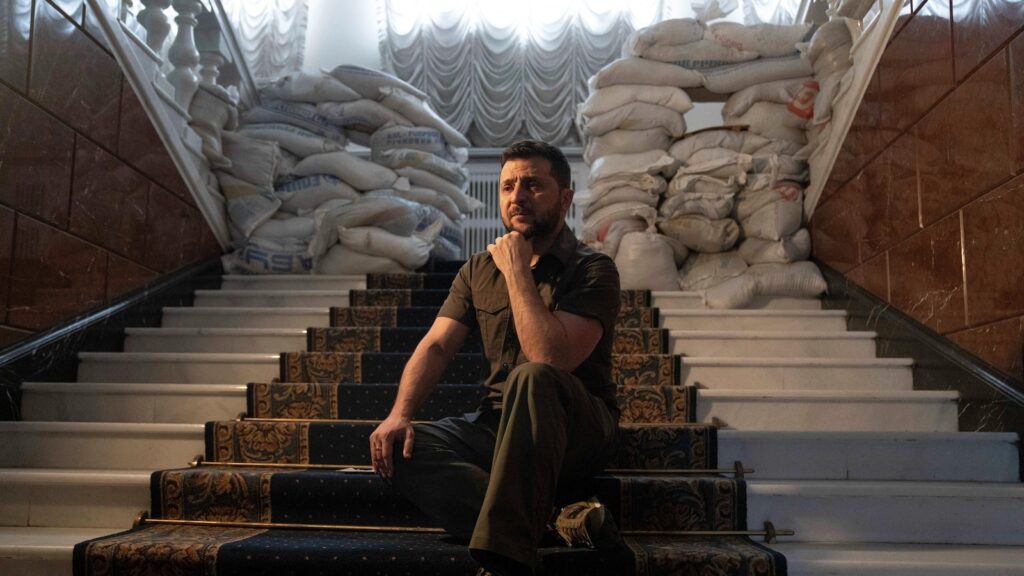KYIV, Ukraine — Ukraine’s Defense Ministry unveiled a new state agency for its armed forces last year. It was the government’s answer to the rampant corruption within the ministry’s procurement companies, and meant to be a driver of reform on the elusive path toward NATO membership.
The enterprise, in charge of purchasing nonlethal military goods such as food, clothes and fuel, has already contracted 95% of the products requested for supply, and saved 25% in the process, says Arsen Zhumadilov, the CEO of the State Logistics Operator, known by the local abbreviation DOT. Soon, he says, DOT also will begin procuring drones.
These kinds of results are an example of the type of reform that Ukraine hopes will help clear the path toward NATO, a key deterrent against Russia, officials have argued. Membership in the alliance remains largely a political question, with key states reluctant to grant it, fearing escalation from Moscow.
Western officials are also keenly awaiting the inauguration of U.S. President-elect Donald Trump before making declarations. But NATO officials have also demanded widespread anti-graft reforms before Kyiv can join.
Change has been a difficult pill for many within Ukraine’s post-Soviet institutions to swallow.
DOT’s promising results so far stand in contrast to the deeply-rooted challenges that continue to plague the tenure of Defense Minister Rustem Umerov, including slow progress with restructuring the institution and ongoing allegations of corruption within lethal military procurement.
Recently, Umerov has come under scrutiny in the Ukrainian press for appointing ministry officials with whom he also has close business ties, including Zhumadilov.
Western officials are closely monitoring DOT, three Western diplomats told The Associated Press. So far, they have been pleased with the results one year since it was formed. They spoke on condition of anonymity in order to speak freely about their assessments.
DOT embodies the uneasy coexistence of a digital-savvy youthful ethos and paper-heavy post-Soviet bureaucracy. Its office exudes a fresh startup culture vibe, while catering to one of the most stubbornly rigid ministries in the country. The contrast underscores the spirit of how Russia’s war in Ukraine is being fought, in which innovative drone wars coincide with World War II-style trenches.
“We understand that we have been on the radars of NATO, of G7 (Group of Seven) countries, of all NATO member countries in terms of whether we manage or not to put in place a procurement system that is resilient, that is effective, efficient, and that is not prone to corruption,” Zhumadilov said.
Nonlethal military purchases became the focus of two corruption scandals under the leadership of Oleksii Reznikov, the previous defense minister. The first involved inflated prices for food supplies and the other was connected to low-quality winter jackets.
Umerov, Reznikov’s successor, has described DOT as not just a new agency, but as the beginning of a new public procurement architecture in Ukraine’s defense sector. Ukrainian President Volodymyr Zelenskyy specifically tasked Umerov to increase transparency in defense procurement where corruption has always been rife.
Zhumadilov, an influential public figure with Crimean Tatar origins known for spearheading reforms in public procurement, was selected because of his previous track record of success. He previously headed Ukraine’s procurement of medical supplies. He was appointed to the role in Reznikov’s time.
Plastered on the wall of the agency is a mood board devised by the company’s marketing department.
A photo of a military vehicle is placed next to a snaking jungle dirt road, a drone in flight next to a fluffy puppy in midair, a Rubik’s Cube and a designer candle. Staff wear oversized hoodies and T-shirts, a contrast to the military fatigues adorned by ministry officials.
DOT’s answer to increasing transparency is DOT-Chain, an IT system that manages the army’s supply demands by digitizing the entire process, from the submission of applications to issuing invoices. Developed by a team of DOT IT specialists, it could reduce delivery time fourfold and is the largest digital project in the institution. For now it will cover foodstuff, but Zhumadilov envisions scaling it up.
There were blips on the road. A planned merger with the Defense Procurement Agency, the state company in charge of purchasing lethal military supplies, was aborted after NATO officials recommended against it, casting Umerov’s decision-making in a negative light and raising concerns they were driven by personal preferences.
Acknowledging that corrupt practices in defense purchases has plagued Ukraine for years, Umerov has said the state needed to eliminate the “Soviet, oligarchic” approach to public funds.
But, like most things in the war, that is easier said than done.
Zhumadilov said their company still faces resistance from ministry officials set in their old ways.
“We are trying to be open to our colleagues at Ministry of Defense and the Armed Forces of Ukraine, but at the same time, and this is also good news, we are an autonomous agency within a larger ecosystem, we can preserve our own culture here.”
DOT-Chain, which was designed to lower the burden of army paperwork, for instance, still faces pushback from bureaucrats who prefer signing thousands of papers per week to clicking a smartphone.
“They say that we don’t need that. We just want to keep on signing papers,” he said. “We are saying, ‘Look, the sheer amount of papers that you are signing on a weekly basis … it is just unsustainable.’”
___
Follow the AP’s coverage of the war at https://apnews.com/hub/russia-ukraine
